- Home
- M. Louisa Locke
Kathleen Catches a Killer Page 2
Kathleen Catches a Killer Read online
Page 2
Chapter 2
Monday, early morning, December 27, 1880
“…then, she started to cry again,” Kathleen said.
It was six the next morning, and as Kathleen helped Mrs. O’Rourke prepare breakfast, she had told the older woman what transpired the night before.
Beatrice O’Rourke, in her late fifties, started working for Mrs. Dawson’s aunt and uncle, the Waterstones, forty years earlier back in New York. She’d been a young eighteen year old, fresh off the boat from County Cork, but she had an adventuresome streak, the only servant who agreed to travel with them when they sailed to San Francisco in 1850. She only left their employment when she married Peter O’Rourke, who would become a well-respected San Francisco police officer.
Sadly, he’d been killed in the line of duty ten years into their marriage, and she’d returned to work for the Waterstones as cook and housekeeper––the position she retained when the mistress inherited the O’Farrell Street house and decided to take in boarders.
Mrs. O’Rourke was a short, gray-haired, motherly woman who everyone admired, and Kathleen knew how fortunate she was to work under her. She also had complete faith that the older woman would know what to do to make sure Mary Margaret landed on her feet.
“And you are saying they threw the poor dear out at ten at night?” Mrs. O’Rourke said, frowning. “That’s downright criminal. Surely Mrs. Ashburton knew she doesn’t have any family hereabouts to turn to.”
“The problem is that Mrs. Ashburton didn’t come back downstairs, just the son. He dumped all of Mary Margaret’s things in front of her and wouldn’t listen when she told him she had nowhere to go. She said she even begged him to let her say goodbye to her mistress, hoping that she could at least get a promise that she could come back today and get a letter of reference and her back wages.”
“What did he say to that?”
“He laughed and pulled a couple of coins out of his vest pocket and threw them down on her clothes. Said he was sure she’d been able to bilk his mother out of plenty over the years.”
“Oh heavens, what a terrible man. When she gets up, I’ll tell her that she needn’t worry about her back wages. Mr. Dawson, being a lawyer, will know how to get the poor thing what’s owed her. And I’m sure I’ll be able to find a good position for her, leastways after the holidays are over.” Mrs. O’Rourke waved the wooden spoon she’d been using on the oatmeal for emphasis. “We’ll keep her busy this week so she doesn’t dwell too much on what happened.”
Mary Margaret was still asleep, having finally succumbed to exhaustion around midnight. Kathleen wasn’t sure when she, herself, finally dropped off, but she knew she was going to feel the effects of the short night by the end of the day. Thank goodness, with the Steins staying with their older son in Portland for the rest of the week, Mr. Harvey away in Sacramento, and the Dawsons and Mr. Nate’s sister, Miss Laura, not due back until tomorrow, she wouldn’t have much to do beyond the usual wash-day chores. And Mary Margaret had promised to help out as much as she could today.
“I’ll set her to doing some of the ironing, so I can start giving the mistress and master’s room the deep cleaning you wanted done before they get back.” Hearing a sharp rap on the back door, Kathleen said, “Oh, that must be Mrs. Kantor.”
Kathleen’s mistress had hired Mrs. Kantor over a year ago to help with the laundry, saying that having experienced first-hand how difficult it was to get both the washing and ironing done in two days, she’d never ask Kathleen to do that again. Mrs. Kantor took care of the linens, towels, and Jamie’s and Mr. Harvey and Mr. Chapman’s washables, while Kathleen laundered Mr. Stein and Mr. Nate’s clothes and the women’s delicate underthings. Normally she would wash and iron her own and Mrs. O’Rourke’s clothes later in the week, but with six of the eleven boarders in the house gone, she planned on getting all the laundry done today.
As she opened the back door, she stepped back in surprise when she saw Patrick McGee standing there. Patrick was Mrs. O’Rourke’s nephew and, for nearly a year and a half, Kathleen’s official beau. He was also a patrolman on the San Francisco police force. Since he’d been working a second job at night in security for the big emporium, the Silver Strike Bazaar, he’d not been able to make it by in the mornings.
“Patrick, why aren’t you in uniform?” she blurted out.
An infectious smile lit up his broad face, and he swept her up in a big hug, which caused her to squeal.
“Stop it,” she protested. “Whatever will your aunt be thinking of us? What’s got into you?”
“I’m off with Sergeant Thompson on a case, and he said I could wear plain clothes. I really think the job I did for the Silver Strike is going to pay off. He as much as said the next opening in the detective department might go to me!”
“Oh Patrick, that’s wonderful.” Kathleen followed him into the kitchen, where he gave his aunt another exuberant hug.
Over his shoulder, he said, “We’re off on the nine-thirty morning train to Auburn, will get there this afternoon, in plenty of time to interview two suspects for the Christmas Day killing. You must have read about it in the papers. Late on Christmas, two men wearing hoods held up the stage coach that runs between the Auburn train station and Nevada City. One of the passengers was a banker, an Amos Durbin. Fool man decided to try to hold onto his satchel. Even pulled a derringer out and started shooting. As he was playing at tug-of-war with one bandit, the other one shot him. Durbin died last night, so now it’s murder!”
“Patrick, you know what I’ve told you about discussing cases. Your uncle would’ve given you a proper tongue lashing,” Mrs. O’Rourke said sternly, although Kathleen knew she was enormously proud of her nephew.
“Oh, Aunt Bea, everything except the news that the banker died and that there are two men in custody has been in the papers. Besides, the Call’s reporter was already around last night to verify those facts from us, so it’ll be in this morning’s papers.”
“So they think they have got the men? That was fast,” Kathleen said as she went back to getting the platters of eggs, bacon, and fresh rolls ready to take upstairs to the dining room.
“We don’t know that for sure. That’s why Thompson is going to interview them. The two men were caught in Nevada City yesterday with horses that fit the description of the bandits’ mounts, and the sheriff sent them down to Auburn for questioning.”
“But why is the San Francisco police department involved if the robbery and killing was up north?” his aunt asked.
“For one thing, the banker lived in San Francisco, and his family is clamoring for justice. Plus, we have an outstanding warrant for one of the men, a Gus Contreras. He’s a known horse thief, got in trouble a couple of years ago as part of a Chilean gang that operated down the peninsula. Thompson hopes to convince the sheriff to let us bring this Contreras and his partner back to San Francisco. That’s why he’s taking me with him, extra security for the train trip back.”
Patrick smoothed down his mustache and patted the holstered gun he was wearing underneath his good black suit jacket. Kathleen supposed he was trying to look dangerous and ready to confront any number of desperados. Poor man, with his copper curls in wild abandon this morning and his sweet freckled face, he just couldn’t look the part. Especially not wearing the robin’s egg blue vest she’d bought him for Christmas because it matched the color of his eyes.
“Now boy, don’t you go puffing up your importance and trying to scare Kathleen,” Mrs. O’Rourke said. She took the sting out of her words by handing him two egg-and-bacon sandwiches made out of rolls right out of the oven. “Save one of these for that nice Sergeant Thompson. And you take care.”
Kathleen walked with Patrick out into the back yard. Dawn was still at least an hour away, and the palest sliver of the moon above did little to illuminate the darkness. Fortunately, the storm that hit the city on Christmas Eve had mostly blown itself out.
Patrick gave her a swift kiss once he was sure they were out
of his aunt’s sight, and he said, “Wednesday’s still your night out this week, isn’t it? I’ve got to make it up to you that I missed your birthday.”
“Yes, Wednesday, but will you be back by then?”
“Should be. By train it’s less than seven hours up to Auburn. Plenty of time for us to ask some questions and then come back the next day, or by Wednesday afternoon at the very latest.”
Patrick gave her hug, breaking away and giving a cheeky bow to Mrs. Kantor, who had suddenly entered the yard from the back alley.
Kathleen suppressed a spurt of irritation that the laundress had interrupted the brief moment she had alone with Patrick. She thought she’d made her peace with the idea that he worked in a dangerous profession. What working man of his sort didn’t? Draymen got run over by their own wagons, shoe factory workers lost fingers to unforgiving machinery, miners were blown to bits in explosions, and fishermen were lost at sea. And men like her brothers died at construction sites all the time, the way their pa had.
At least Patrick, with his gun and his quick wit, had a fair chance against his adversaries. But it was no wonder she wanted Ian to stay in school, get a safer job working in a store or office.
Waving goodbye to Patrick, she turned to Mrs. Kantor and saw she was struggling to keep a bundle of laundry from spilling open. Running over to help, she said to the woman, whose normally placid face was red with exertion, “What’s all this?”
“Miss Kathleen, you won’t believe it. This here’s old Mrs. Ashburton’s laundry. You knows I usually do it Fridays, but with the holiday and that dreadful storm last week, Mary Margaret said I could pick it up this morning and get it back to them tomorrow. But I gets there, and there’s no laundry sitting in a basket on the porch the way she always leaves it. So’s I knock on the back door a couple of times. No answer. I’m standing there thinking maybe the girl’s still asleep or something…when this man opens up the door and shouts at me.”
“Oh no, Mrs. Kantor. What did you do?”
“I tells him who I am. He says he’s the son and I should go away. Then he changes his mind, tells me to stay put, and leaves me on the doorstep. I’m thinking he’s getting Mary Margaret, but before you knows it, he’s back, and he throws this pile of sheets and towels at my feet and shuts the door in my face!”
Chapter 3
Tuesday morning, December 28, 1880
Kathleen took up the heavy iron that had been heating on the stove and carefully tested it on the scrap of linen she kept on the board. Then she pressed the collar and cuffs of David Chapman’s second-best shirt. These were still the slightest bit damp, so the hot iron made smooth work of removing the wrinkles. Next came the sleeves, and then the back, where she had to work harder to achieve success as the iron was beginning to cool.
Time to put this iron back on the stove to heat and use the one that had been heating before she started ironing the shirt front. If she timed it right, after finishing the front, the iron would still be hot enough to do the back of the shirt. But a few faint creases at the back wouldn’t matter so much since Mr. Chapman would be wearing both a vest and a suit coat all day at his job as a purchasing agent for Mitcherson’s Dry Goods store. He had the kind of job she imagined Ian getting if he stayed in school.
Mary Margaret, who was folding the towels that had been drying all night next to the oven in the kitchen, said, “Oh, there’s Mrs. Kantor coming into the back yard. I wonder if she saw my mistress this morning when she dropped off the laundry? I would be able to rest easy if I just knew Mrs. Ashburton was all right. If she doesn’t get her digestive powder first thing, she has such trouble the rest of the day.”
The stout laundress bustled in as Mary Margaret opened the door for her. Mrs. Kantor always wore an old black straw hat, and the first thing she did was carefully unpin it so as not to disturb the thick braid of dark brown hair that wound around her head. She put the hat on the shelf next to the kitchen clock, shrugged out of her shabby wool coat, and pulled out a voluminous apron from her bag.
Mrs. Kantor didn’t normally work a second day for them, but Monday, when she mentioned she was going to have to come back to this neighborhood to deliver Mrs. Ashburton’s laundry, Mrs. O’Rourke had asked if she could give them another couple of hours this morning. The housekeeper was planning on getting the lace and chintz sheer draperies washed while the Steins’ and the Dawsons’ rooms were unoccupied. Even with Mary Margaret and Kathleen to help, they could use Mrs. Kantor’s strong arms and genius with the laundry room’s box mangle to handle such large but delicate pieces of cloth.
Kathleen handed the laundress a cup of hot tea, and Mrs. Kantor said, “Thanks, dearie. Miss Mary Margaret, good to see you’ve perked up a sight since yesterday. I still can’t get over the notion that your mistress would let you go like that, during the Christmas holidays.”
Mary Margaret shook her head and protested, “I don’t blame Mrs. Ashburton. She’s a wonderful woman. It’s her son, that Rafe, who’s to blame.”
“Did you try to see her yesterday?”
“No, I decided I didn’t want to put her in a bad position with her son. I thought maybe on Wednesday I would go to All Saints Episcopal, down Eddy on Polk. She never misses the morning service. See if I could catch her alone. I would at least have some peace of mind if I could see her.”
“Well, I think that is a mighty sensible plan,” Mrs. Kantor said.
This question of whether or not Mary Margaret should go to her old place of work, demand to see her former mistress, or at the very least send a letter asking for a reference and her back wages, had been the topic of conversation all yesterday.
Even little Tilly, the young Irish girl who now worked days at the boarding house, had an opinion. After hearing both Mary Margaret and Mrs. Kantor describe the son as appearing bad tempered, Tilly had squeaked out, “No, no, don’t you be thinking of crossing him. Sounds just like my dear departed mother’s oldest brother back in Dublin. If he was in drink and didn’t like the way you looked at him, bam! Back of his hand across your face.”
Kathleen thought that Tilly had spoken aloud what all of them had been thinking. Wasn’t a one of them that didn’t have some personal experience with a man, often a male relative, who could fly off the handle like that. Always sorry when they sobered up.
Mrs. Kantor took one long last sip from her tea and said, “That certainly hit the spot. Been working long hours to get everyone’s washing caught up. You wouldn’t believe the stains I’ve had to deal with…cause of the holidays. Table cloths and napkins are the worst. Wine, cranberry juice, coffee, you name it. And so few take the time to soak the stains the way you do, Miss Kathleen.”
Kathleen felt a blush of pride, and she said, “You can believe Mrs. O’Rourke taught me just what to do.”
Mrs. Kantor smiled and turned to Mary Margaret. “Of course the same goes for you, always so thoughtful, laundry sorted, pre-soaked. That’s why I knew that Mrs. Ashburton’s son had added some towels and handkerchiefs to the pile he sent off with me yesterday. You’d never have been so careless with stains like that.”
Mary Margaret, who had just picked up a stack of folded towels to take upstairs, said, “What stains? I had the basket of laundry sitting right by the back door, and there weren’t any stains.”
Mrs. Kantor shook her head sadly and said, “Well, I can tell you one of Mrs. Ashburton’s nice towels is downright ruined. Looked to me like her fool son used it to polish his shoes or something. Left black smears that even scrubbing and my special powder couldn’t get rid of all the way. Such a shame.”
“What about the handkerchiefs?” Kathleen asked. “There were stains on them, too?”
“Yes, on a couple of them. The son must have cut himself and mopped himself up with these big old neckerchiefs. Maybe shaving, since he did have some plaster on his chin. Some men bleed like stuck pigs if they nick themselves.”
Mary Margaret said, “I guess that’s possible. The son had a full beard and bushy
mustache when I saw him. And long greasy hair down to his collar. I remember thinking that Mrs. Ashburton wouldn’t like that. He looked like some sort of mountain man. So he’s shaved the beard off?”
“Oh yes, had just a small, trimmed mustache, practically no sideburns to speak of, and his hair was short and all slicked back. Handsome man, despite his bad manners. He was certainly more friendly to me this morning. When I handed over the laundry, he promptly paid me, even added a nice tip and asked me if I could recommend a dry goods store that sold decent ready-made suits. But enough nattering on. Time for me to get to work on those curtains.”
As Mrs. Kantor put her cup down in the kitchen sink, she looked out the window into the yard and said, “Here comes young Master Jamie, with his dog, and looks like a friend as well. Enjoying the week off from school for the holidays, I’ll expect.”
The kitchen door opened with a bang, and Kathleen, who’d returned to her ironing, said sharply, “Ian, Jamie, you need to take Dandy right upstairs. Last thing we need is for him to knock over my ironing board or stick that nose of his into the clean laundry.”
Jamie Hewitt, who lived on the top floor of the boarding house with his mother, Barbara Hewitt, was a tall, sturdy ten-year-old boy, with curly light-brown hair, light-brown eyes, and a turned-up nose. He also, perhaps for good reason, took life very seriously. His companion, who was Kathleen’s youngest brother Ian, was as different from Jamie as night to day. Although a year older, Ian was slight in stature, small boned, with black hair and lively dark blue eyes. And no matter what happened, he saw life as sunny-side up.

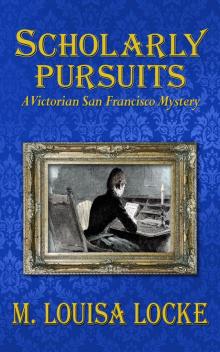 Scholarly Pursuits
Scholarly Pursuits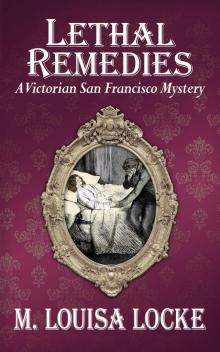 Lethal Remedies
Lethal Remedies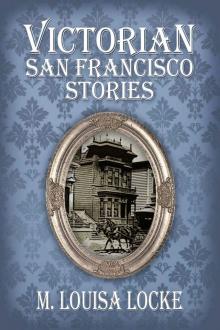 Victorian San Francisco Stories
Victorian San Francisco Stories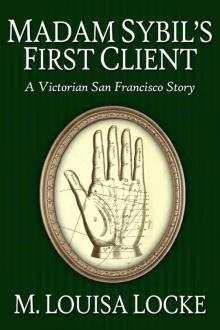 Madam Sibyl's First Client: A Victorian San Francisco Story
Madam Sibyl's First Client: A Victorian San Francisco Story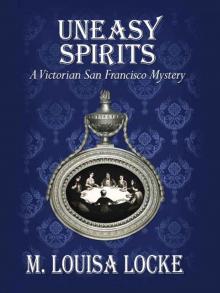 Uneasy Spirits: A Victorian San Francisco Mystery
Uneasy Spirits: A Victorian San Francisco Mystery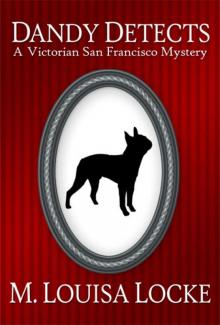 Dandy Detects: A Victorian San Francisco Story
Dandy Detects: A Victorian San Francisco Story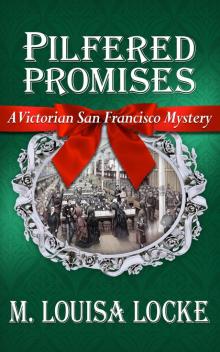 Pilfered Promises
Pilfered Promises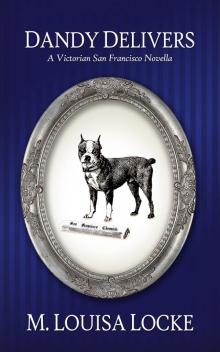 Dandy Delivers
Dandy Delivers Kathleen Catches a Killer
Kathleen Catches a Killer Violet Vanquishes a Villain
Violet Vanquishes a Villain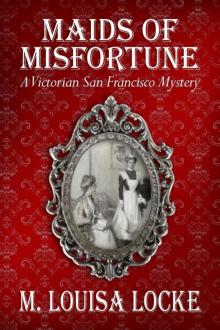 Maids of Misfortune: A Victorian San Francisco Mystery
Maids of Misfortune: A Victorian San Francisco Mystery